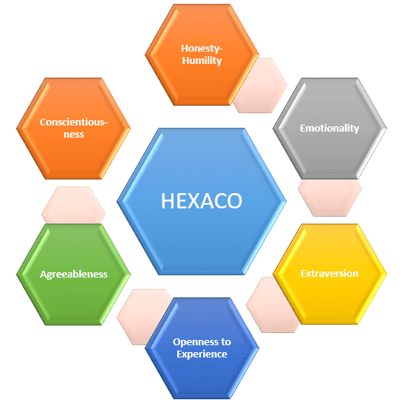Human psychology is probably one of the most challenging issues to study today. Therefore, personality assessments require a lot of time and effort but might not always yield reliable results. A more systematic approach was developed to support this process - the HEXACO model of personality, created by Ashton and Lee, based on the work of Costa, McCrae and Goldberg.
Read more: What Are Psychometric Assessments?
The essence of the HEXACO model is dividing your personality into six distinct facets. But what are these facets, and how can they benefit recruitment?

Contents
- What is the HEXACO model of personality?
- The power of HEXACO in recruitment
- Weaknesses and limitations of the HEXACO model
What is the HEXACO model of personality?
At its core, the model categorises our personalities into six distinct key dimensions: Honesty-Humility, Emotionality, Extraversion, Agreeableness, Conscientiousness, and Openness to Experience.
Each dimension comprises specific traits, which are decoded as follows:
- Honesty-Humility (H): Sincerity, Fairness, Greed Avoidance, Modesty
- Emotionality (E): Fearfulness, Anxiety, Dependence, Sentimentality
- Extraversion (X): Social Self-Esteem, Social Boldness, Sociability, Liveliness
- Agreeableness (A): Forgivingness, Gentleness, Flexibility, Patience
- Conscientiousness (C): Organisation, Diligence, Perfectionism, Prudence
- Openness to Experience (O): Aesthetic Appreciation, Inquisitiveness, Creativity, Unconventionality
Read more: Why the MBTI Personality Test Is as Useful as Astrology

The question remains, what benefits does this model offer and how can it enhance the recruitment process?
The power of HEXACO in recruitment
Since its early development in the early 2000s, the HEXACO model has been used to investigate different areas of psychology, allowing behavioural testing and prediction to rely less on prosocial behaviour. Studies using the HEXACO model have found support for the relationship between social and ethical behaviour.
Personality assessments can provide a more holistic view of a potential candidate. While resumes and interviews can provide valuable information, they often focus on skills and qualifications, neglecting important aspects of personality that can greatly impact job performance and team dynamics.
Personality traits can offer valuable clues about a candidate's work ethic, social status, and overall fit within the organisation. By understanding a candidate's personality beyond what can be revealed in an interview or on a resume, the Human Resources department and hiring managers can better assess their potential fit with the applied position, the respective team, and the organisation's culture.
Read more: The Impacts of Behavioural Science On HR (Part 1)
HEXACO-based assessments enable employers to make more informed hiring decisions as well as for employee development and retention. Once individuals are hired, their personality traits can be used to identify areas for growth and improvement. By understanding an employee's personality, managers can tailor their approach to coaching and developing their team members, increasing job satisfaction and overall productivity.
The HEXACO assessment comes in various versions, with a minimum of 60 questions to ensure a reliable evaluation. For higher accuracy, extended versions with 100–200 questions are available. Remember, the quality of your assessment questions directly impacts the reliability of your candidate profile.
Limitations of the HEXACO model
However, as with any classification system, the HEXACO model has limitations. Generally, characteristic measuring methods, including the HEXACO model, are often based on factor analysis. Factor analysis does not always guarantee the same outcomes in every situation.
Furthermore, any declarations on the universality of the HEXACO model should be considered with caution, as many languages and cultures have not been considered during the study.
Read more: Companies’ Views on Talent Management (Part 1)
The HEXACO model offers a valuable framework for understanding personality, especially Agreeableness, Emotionality, and Honesty-Humility. But it is just one perspective in a vast landscape. In a world rich in diversity and individual experiences, no single model can fully capture the human personality, and HEXACO might not always be the ideal personality assessment tool in every situation.
Nevertheless, incorporating a personality assessment into your recruitment process can streamline it and increase efficiency. Moreover, as mentioned above, insights from the assessments are useful in helping hiring managers make more informed decisions, thus not risking losing valuable candidates just because their resumes are not pretty or they were not their best during interviews.
The assessment can also help eliminate cognitive or unconscious bias. By using a standardised and objective assessment tool, you can ensure that all candidates are evaluated on the same criteria, reducing the risk of subjective judgements and biases.
Additionally, the use of a personality assessment can enhance the overall candidate experience. By incorporating an assessment as part of the recruitment process, candidates feel that their application is being evaluated fairly and comprehensively.
This can improve their perception of your organisation and increase their likelihood of accepting a job offer. The assessment can provide candidates with valuable self-reflection and self-awareness, allowing them to better understand their own strengths and areas for improvement.
It is of utmost importance for businesses to carefully select assessment providers whose tests are scientifically backed, as this ensures more accurate results and ultimately improves the quality of their workforce.
If your organisation is exploring this realm, TRG Talent is more than willing to assist you on your journey to unlock the full potential of your talented individuals. Feel free to reach out and request a demo, as we are committed to helping you succeed.
 English
English  Vietnamese
Vietnamese 


